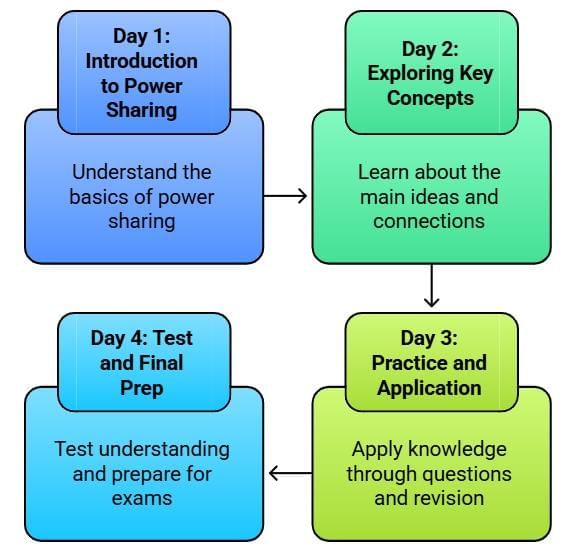4 Days Timetable: Power Sharing | Social Studies (SST) Class 10 PDF Download
| Table of contents |

|
| Topics to Cover |

|
| Day 1: Getting Started with Power Sharing |

|
| Day 2: Exploring Key Concepts |

|
| Day 3: Practice and Application |

|
| Day 4: Test and Final Prep |

|
The chapter "Power Sharing" is a crucial part of Class 10 Social Science, specifically from the book "Democratic Politics." Understanding the concepts in this chapter is essential for your Class 10 board exams. This chapter explores various aspects of power-sharing in different countries and helps you understand the importance of shared governance.
You can adjust the timetable to your pace, but the order of topics should remain consistent. Effective preparation and a structured study plan will help you master the content and perform well in your exams.
Topics to Cover
Before we begin our study plan, let's outline the topics we need to cover in this chapter:

Now, let's break down our study plan for this chapter:
Day 1: Getting Started with Power Sharing
Goal: Understand what power sharing is and its importance.
- Morning (30 mins): Watch the video Power Sharing for a quick introduction.
- Afternoon (45 mins): Read Chapter Notes: Power-sharing to learn about forms of power sharing.
- Evening (30 mins): Use Flashcards: Power Sharing-1 to memorize key terms like horizontal and vertical power sharing.
Day 2: Exploring Key Concepts
Goal: Learn how power sharing works in real life.
- Morning (40 mins): Study Key Concepts: Power-sharing to understand the main ideas.
- Afternoon (45 mins): Check out the Mindmap: Power Sharing to see how concepts connect.
- Evening (30 mins): Practice Very Short Questions: Power Sharing to test your knowledge.
Day 3: Practice and Application
Goal: Solve questions and apply what you’ve learned.
- Morning (45 mins): Work on Short Answer Questions: Power-sharing to practice writing clear answers.
- Afternoon (40 mins): Review the Cheatsheet: Power Sharing for quick revision.
- Evening (45 mins): Try Case Based Questions: Power Sharing to understand real-world examples.
Day 4: Test and Final Prep
Goal: Test your knowledge and prepare for exams.
- Morning (45 mins): Take the Test: Power-sharing - 1 to check your understanding.
- Afternoon (40 mins): Study Sure Shot Questions for Board Exams to focus on important topics.
- Evening (30 mins): Use Mnemonics: Power Sharing to remember key points easily.
Here are all the important links and topic links for the chapter "Power Sharing" in Class 10 Social Science:
Important Links:
- Class 10 Boards: Explore additional resources for Class 10 board exams.
- Past Year Questions: Access past year board exam questions for practice.
- Chapter: Power Sharing: Additional resources related to the "Power Sharing" chapter.
Topic Links:
- Chapter Notes: Power Sharing: Detailed notes on the chapter's content.
- NCERT Textbook: Power Sharing: The official NCERT textbook for the chapter.
- NCERT Solutions: Power Sharing: Solutions to exercises and questions from the NCERT textbook.
- Short & Long Questions: Practice short and long questions related to the chapter.
- Topic Wise Test: Test your knowledge with topic-wise quizzes on power-sharing.
- Extra Questions: Power Sharing: Access additional practice questions.
- Mindmap: Power Sharing: Visual representation of key concepts in the chapter.
- Flowcharts & Important Terms: Helpful visual aids and important terms.
- Crash Course Social Science Class 10: A quick revision course for the chapter.
- Assertion & Reason Type Questions Test: Test your understanding of the chapter with assertion and reason-based questions.
- Assertion & Reason Based Questions: Practice solving assertion and reason type questions.
- Practice Questions: Additional practice questions for thorough preparation.
- PPT: Power Sharing: PowerPoint presentation for visual learning.
- Worksheet: Power Sharing: Practice worksheets for self-assessment.
- Worksheet Solutions: Power Sharing: Solutions to the practice worksheets.
- Key Concepts: Review key concepts from the chapter.
Use these links for reference and practice to excel in your Class 10 board exams.
Good luck with your preparations!
|
66 videos|614 docs|79 tests
|
FAQs on 4 Days Timetable: Power Sharing - Social Studies (SST) Class 10
| 1. What is majoritarianism and how does it affect Sri Lanka? |  |
| 2. What are the different forms of power-sharing in a democratic setup? |  |
| 3. How can the accommodation of different ethnic groups in Belgium serve as a model for Sri Lanka? |  |
| 4. What are the challenges faced by Sri Lanka in implementing power-sharing mechanisms? |  |
| 5. Why is accommodation important in a multi-ethnic society like Sri Lanka? |  |





















